The only fitting way to end February’s Love Dare Challenge is in conversation with my fiancé, Janie, the woman lucky enough to be the recipient of a month’s worth of relationship dares. (That’s a joke; sort of.) But seriously, if anyone could speak to the effectiveness of February’s challenge, it would be her.
Last night, she graciously agreed to be interviewed. For a month, readers of my blog have only gotten my opinions of the Love Dare; its high time my fiancé’s wit and wisdom were given a chance to shine.
Thanks for going on this journey with me - see ya in March!
1) Summarize your feelings about the Love Dare:
Janie: "I think the Love Dare is a good idea, although its certainly not going to fix everybody’s problems – remember that couple whose copy of the Love Dare you found at Half-Price Books? … The movie Fireproof makes it seem like the Love Dare is geared toward males, but it would be a good idea for females to do it as well, as not all relationship problems fall onto the husband. It’s got some great ideas, but again, I don’t see it as capable of solving all your problems."
"The biggest thing to understand is that the Love Dare is not just a forty-day challenge, its something that never really ends – it carries itself into the next day, and into the next day, and continues to build. Each day you have to wake up and choose to love your spouse. If you forget this fact, the Love Dare won’t be able to do much for you."
2) What’s been your favorite or the most meaningful of the Love Dares?
Janie: (Laughs) "The most meaningful was probably the day that we got into a fight and I told you to stop acting like a middle schooler – your body language was screaming negativity even if your words weren’t. We finally worked it out, and then the next morning, your Love Dare reading told you to watch your expressions and body language around your spouse. It was meaningful just because its been something I’ve been trying to convince you of for a great deal of our dating relationship, so it was good to see you writing about it and finally owning up to it."
"My favorite dare was our Valentine’s date night where we tried all new things – we had that yummy Nicaraguan food and you created the Toys-R-Us scavenger hunt for us. That was really fun because it was unexpected, and it meant a lot because I could see your effort in planning it all."
3) What was the most challenging of the Love Dares?
Janie: "The day that you had to cook dinner for us – it was difficult for me because I have a natural culinary mind and feel like the kitchen is my territory. While you were cooking, I had to stop myself from coming in and helping, offering advice and tips on how to make the food taste the best. But you did great without my help!"
4) Would you recommend the Love Dare to others?
Janie: (long pause) "Probably not – I only want to recommend something if I am confident that it will dramatically alter their lives and I’m not sure the Love Dare would do that. For instance, I’ll always recommend books like Blue Like Jazz and The Irresistible Revolution because they have literally changed the course of my own life, but I don’t feel confident saying the same about the Love Dare. Like I said earlier, I don’t think the Love Dare is a terrible idea, but I don’t see it as a cure all. I guess what I’m trying to say is that, if a couple in dire relationship turmoil came to me for help, my first recommendation probably wouldn’t be this book."
5) Do you think it’s produced any change in me?
Janie: "Yes. I’ve seen you learn to control your attitude and tongue – not that it was a huge problem before, but I can tell that you are developing more self control in that category. You’ve also come to the conclusion that you need to be a better leader through the example you set… and its brought about some spiritual changes for you as well, committing to spending more time with Jesus and in prayer. I also think its helped you learn some of the best ways to show love to me, as well as recognizing others which are less effective. Overall, I can see a change in you and in our relationship."
Today’s Dare: “Eliminate the poison of unrealistic expectations in your home. Think of one area where your
spouse has told you you’re expecting too much and tell them you’re sorry…”
February is quickly approaching it’s close, and with it, so too are my blogs on the Love Dare. The authors behind the bookdesigned it to be a forty-day experiment and I do intended on finishing the next thirteen dares – you just won’t be reading about them on here. The start of the new month will bring with it a new challenge; but first things first, after all, it is still February.
When asked if January’s challenge, listening to nothing but Christian music, had brought about any positive change in my life, my fiancé answered with an overwhelming: “not really.” This month, however, finds us both agreeing that the Love Dare experiment has been extremely positive for us as a couple. Of course, that’s not to say that this book has been a magic spell solving all our problems – far from it – but in the midst of everything from arguments to love notes, the influence of the Love Dare has been ever present. More than any other book before it, the Love Dare has given me insight into the marriage relationship and what it means to be a godly spouse. As I started this challenge, I wasn’t sure I’d get much out of it, seeing that I wasn’t yet married and wouldn’t be for another ten or so months. I may have started off skeptical, but it took only a few days for me to completely cast that doubt aside. To my surprise, things started to change – and fast. This challenge has been nothing short of a relational growth spurt, leaving me feeling more prepared than ever to enter into this marriage covenant with my beloved.
I drive to my grandparents’ house a few times each week, every time passing the Eastside Technical School on Liberty Road. Like most schools and churches, Eastside has a sign on the front of their property with removable letters, the staff using it to post inspirational quotations and calendar updates. The other day, as I passed the school yet again, three simple words on their sign caught my attention and pulled at my heart. Attributed to the theologian and medical missionary Albert Schweitzer, the sign read simply, “Example is Leadership.”
Following the Love Dare for the past month has taught me more than I could ever hope to summarize in a blog, but if I had to pick one overarching thought, it would be this – love takes the initiative. Complaining rarely solves problems; in a healthy marriage, this bad habit is replaced with action. Instead of berating my spouse for her negative attitude, I should model a positive one, going out of my way to encourage her for the good things she does. If I desire a more joyful home, it is my responsibility to create that through my own words and deeds. If I want my marriage to be built on prayer and a common pursuit of Christ, it is up to me to allot time for that.
On December 15th, when my fiancé and I join our lives together as one, it will become my job, for the remainder of my life, to lead our household. Mr. Schweitzer hit the nail on the head – the best (and perhaps only) way to truly lead is through example. In our world, most husbands try to lead their families through force, demanding change from their wives and children; yet when it comes time for the actual work of modeling that change, they want little to do with it. But the fact of the matter is I can demand nothing of my wife (or children) that I do not first require of myself. The words of John’s first epistle should be tattooed on the heart of every husband: “let us not love with words or tongue, but with actions and in truth.”
In this year of challenges, I’m convinced that marriage will be, far and away, the most difficult. But with it also comes the possibility for the greatest joy of all, becoming for your spouse (and family) a physical example of the unconditional love of Christ. But this requires so much more than just talking a big game – it necessitates dying to one’s pride, taking the initiative, and doing good instead of complaining.
“Example is leadership” – such simple words; such profound truth.
Today’s Dare: “ Remove anything that is hindering your relationship, any addiction or influence that’s stealing your affection and turning your heart away from your spouse.” Today’s reading from the Love Dare focused on fighting for your spouse against the “enemies of marriage.” Among these enemies were unhealthy relationships (taking advice from unwise friends or allowing opposite-sex relationships to advance beyond friendship), harmful influences (allowing the TV to dominate your home or having uncomplimentary work schedules), and parasites (addictions that rob the life from marriage such as gambling, drugs or pornography). Addressing the men reading their book, the authors encouraged them to live into their role as the head of the home, “ guarding the gate and standing your ground against anything that would threaten your wife or marriage.” This is great advice. Take it from someone whose had to confront the demons of pornography, that road leads only one direction: to destruction. Through the faithfulness of my God and the depthless forgiveness of my fiancé and family, I’ve found freedom from an addiction that should have ruined me. Next, turning their attention to women, the authors warned them to “ guard your heart from being led away through novels, magazines, [and] entertainment that blurs your perception of reality and puts unfair expectations on your husband.” Earlier this year, I became familiar with the term “ emotional pornography” through my fiancé, who was teaching some girls from the youth group about it. Used more in conjunction with women than men, this term refers to movies, books, and music that influence our understanding of love to such a great degree that they actually change it. The Twilight book series, to use just one example, has convinced millions of readers worldwide that this is what true love looks like – in reality, the “feelings” that these humans, vampires and werewolves have for each other border more on obsession than the self-sacrificing love that marriage requires. It is of utmost importance, as we partake in the culture around us, that the lines between “fantasy” and “reality” do not become blurred. Men must remember that the women between the pages of the Sports Illustrated Swimsuit Edition are not real – modern technology allows their bodies to edited by computers, recreating them into a version of themselves that men find more desirable. Partaking in any kind of visual pornography (including the Swimsuit Edition) creates unrealistic expectations of the real women in your life; it is both an insult to them and their Creator, who crafted them with authentic, and not computer-generated, beauty. Likewise, romantic films and books, traditionally marketed to women, do not generally reflect actual life-giving relationships. They have been edited to include all the sweet, emotional moments, while leaving out all the hard work and sacrifice that real love requires. When women expect the men in their lives to always be as perfectly romantic as Edward or as shockingly buff and strong as Jacob, they miss out on other traits God the Father has bestowed upon their mates – less “flashy” attributes like faithfulness, gentleness or patience. Pornography, be it visual or emotional, is based on lies. If romance is to be sustained, if our dating or marital relationships are to last over the long haul, then they must be built on truth. There’s no other way around this. All this talk reminds me of a song by one of my favorite bands of all time, the Avett Brothers. Taken from their 2003 album A Caroline Jubilee, I’m pleased to share the aptly titled Love Like the Movies with you. I hope it helps you uncover the truth in a world overrun with lies.
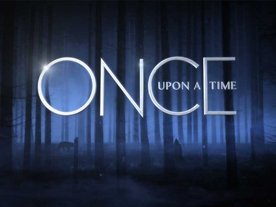 Yesterday’s Dare: “Look back over the dares from previous days. Were there some that seemed impossible?"
My favorite TV show right now is Once Upon a Time (Sunday nights, 8pm, ABC). Set in the aptly named town of Storybrooke, Maine, it recounts the tales of the beloved storybook characters we all knew and loved as children: Snow White, Prince Charming, Rumpelstiltskin and even Jiminy Cricket all make their residence in this fictional town. There is, of course, a catch – every character living in Storybrooke has unknowingly been put under the spell of an evil witch, causing them to be trapped in our world with no knowledge of their actual identities or their past lives in “storybook land.” There are only two people who know the truth – the evil witch, now the mayor of Storybrooke, and her adopted child, Henry. The only person who still reads and believes in fairy tales, Henry has been able to deduce, with no help from his evil step-mother, the truth behind the town of Storybrooke. With the help of a few faithful townspeople, Henry has set out to discover just how to set things right again.
The witch was able to erase the memories and identities of the residents of Storybrooke, but her spell was limited – it left the deepest parts of each character’s soul untouched. The truth still lies deep within each of them. This is why the men who were once Jiminy Cricket and Geppetto remain best friends in Storybrooke, why the Red-Riding Hood character runs a diner with her grandmother, and why the residents who were once Snow White and Prince Charming are drawn to each other by a force deeper than even they can understand. It goes without saying that the witch seeks to keep all the residents of Storybrooke ignorant of their identities, dousing the embers of hope or self-awareness that threaten to creep to the surface.
The main plot line of Once Upon a Time centers on the love story between the Snow White and Prince Charming characters. Their potential relationship being a danger to the witch’s power, she makes it a point to endlessly thwart every attempt the couple makes to be together. The biggest hurdle she has thrown in their path – the “marriage” of Prince Charming. Because he has no recollection of his past, the witch easily tricks him into believing he has already committed himself to another woman; thus, he can never be with Snow White. At this point in the story, Prince Charming and Snow White feel a force drawing them together, but the tricks of the witch make it seem impossible that they will ever be together. The curse is crushing all hope of their storybook ending before it can even begin to bloom.
Twenty or so days into the Love Dare, I was feeling pretty accomplished, sure that I was on my way to becoming a “model” husband, when a statement the authors made shook me back into reality: “the Love Dare starts with a secret…you cannot manufacture unconditional love out of your own heart. It’s impossible. It’s beyond your capabilities.” Well, crap.
Initially, I didn’t want to believe it, but even most the cursory of looks confirms the authors’ statement. The majority of the youth at the church where I work come from homes in which divorce has split the family unit; magazines at the checkout counter of the grocery store broadcast which celebrity is cheating on their spouse this week; daytime TV focuses a significant amount of their time on advising couples on how to resolve marital issues; the relationship section of every bookstore in town teems with people willing to try the next marriage-fixing fad. We’re living in the breakdown, a time when true love seems to be endangered, if not already extinct. It’s enough to make one hopeless, to make you feel like a curse is stopping us all from knowing true love.
And, in fact, that’s exactly what’s happening.
One of the shortest statements in the Bible is also one of it’s most profound – 1st John 4:8 says, “God is love.” The God who spoke all of creation into existence, who hung the moon and stars in the sky and taught them how to shine, is Himself the very definition of perfect, unconditional love. Nothing we can do can cast aside His overwhelming affection for us, because at His core, He is love. And this love is personal, on an individual level: He loves you; He loves me; He loves my grandmother, the murderer in jail, and the unfriendly teller at my bank. The list goes on and on, including every single person from the over 7 billion people currently residing on planet earth. Like a parent that disciplines his children, God’s love doesn’t give us a free pass through life, but among so many other things, it does teach us an important lesson: how to love others.
The story of the Bible starts in a garden, where God is living among His creation; included in this garden party are the first two humans, Adam and Eve. Since God is love, and Adam and Eve literally lived in His presence, they must have felt an overwhelming affection not only for God Himself, but also for each other. Love rubs off on us – that’s why we cry at the movies and find so much joy in weddings. Likewise, living alongside the very definition of love, Adam and Eve must have had the healthiest human relationship this earth has ever seen. But as is the case in fairy tales, this storybook love is ruined by a curse – in the Bible, that curse is sin. When Adam and Eve stopped trusting God and willingly broke His commands, they were forced out of the garden, permanently separated from the physical presence of God. The first divorce on earth was not a splitting up of a human couple, but the casting aside of the perfect, life-giving love of God by His creation. No longer living in the presence of perfect love, how Adam and Eve’s relationship must have suffered. We all bear the consequences of that curse. Love is hard work, and at times, even seems impossible.
Fast-forward thousands of years and we still haven’t learned the lesson of Adam and Eve: love cannot be sustained under our own power. Since the curse, since humanity was sent out of the garden, our love has ceased to be perfect; it’s been contaminated by selfishness, pride, and even abuse. In the gospel of John, Jesus teaches His disciples that they can do nothing apart from Him – this truth certainly applies to love as well. Love and God cannot be separated because God is love. Without Him, our love is cursed. The only way to truly love another human being unconditionally and irrevocably, the type of relationship that marriage demands, is to first know and experience the love of God. Like an apprentice learning to perfect a trade, we learn how to love others by imitating the love God offers us. Of course, our human condition may impede our progress, but with the only perfect Lover as our mentor, what once seemed impossible – loving a flawed human being – can become reality, for “nothing is impossible with God.”
In the fairy tales, there is one power always stronger than the magic of a curse – true love. It awakens sleeping princesses, turns beasts back into men, and propels knights to stare down the eyes of angry dragons. Love is the one thing that could always set a prisoner free.
Author C.S. Lewis described the story of God’s redeeming love for His creation as “the myth that became fact.” Perhaps in revisiting these fairy tales and myths, we can catch a glimpse of an eternal fact – that true love still has the power to set us free. Unlike those storybook tales, though, its not the love of another human being, but the perfect love of an everlasting God which will free us to know life, and love, as it was created to be experienced.
When my marriage begins in December, I need not be confused about how to properly love my wife – I need only imitate the great love that the Heavenly Father showers upon me, a love strong enough to break the power of the curse that makes love seem impossible.
There may be more truth in those fairy tales than meets the eye.
Yesterday’s Challenge: “Prepare a special dinner at home, just for the two of you…”
I’m not very good with surprises. As a kid, it didn’t take my brothers and I long to determine that our mother hid Christmas presents in her closet. When she was out of the house, we’d sneak in and poke around, seeing what we could find. She eventually got wise to us, wrapping our presents behind locked doors as soon as she returned home from shopping. We didn’t let that stop us; collectively, the Mathis brothers figured out how to unwrap the corners of our presents just enough to get a glimpse of what lay on the other side of the pretty paper. We’d then neatly fold it all back together, our parents none the wiser. For us, patience was less a virtue, and more a hindrance.
As a man, I still don’t do very well with surprises – I’d much rather know what’s coming so I can prepare for it. Case in point: the Love Dare. Instead of leisurely moving through the challenges one day at a time, I constantly find myself sneaking peaks at the future dares. It pays to be prepared, right?
On Friday, while flipping through the Love Dare, I discovered that my challenge for Sunday would be to prepare dinner for my fiancé. Her first response: “please don’t make spaghetti again.”
“I’m a great cook,” I responded.
She laughed.
In defense of my culinary skill, I had no choice but to awe my beloved with a meal that didn’t involve pasta or tomato sauce. A few days before Mardi Gras, I settled on a Sunday lunch of crab cakes, creole rice, and greens.
As soon as church ended, I rushed home and right into the kitchen. I had little over an hour before Janie would arrive. I threw the rice into the cooker, formed the crab cakes, and got the greens and veggies simmering on the stove. Before long, my house was filled with the scent of New Orleans, minus the booze and bad decisions.
When Janie arrived around two o’clock, I was still cooking furiously. An hour later, I finally putt the finishing touches on the meal. Personally, I blame the frying pan – it’s not flat, so all the cooking oil bunches up at one side, meaning the crab cakes took much longer than anticipated to complete.
It may have been an hour late, but by the smell of it all, it was going to be well worth the wait.
As she put down her fork, leaning back contentedly on the couch, Janie said words I was not expecting to hear: “you’re right… you can cook.”
Now there’s a surprise I can live with.
Today’s Challenge: “Choose a way to show honor and respect to your spouse that is
above your normal routine… show your mate that he or she is highly
esteemed in your eyes.”
One of the many things I love about Kentucky is its dialect – it’s a place where we live in “hollers,” sleep in “be-yuds” and boo every time that basketball team from “Luhvul” takes the court. Having spent the vast majority of my life in the Commonwealth, I’d never been aware of having an accent before – all my friends and family sounded just like me – until a high school mission trip to Baltimore. I was in a restaurant, mindlessly placing my order, when I looked up into the confused eyes of the waitress. She didn’t understand a word I’d said. “You’re not from around here, are you?” she asked.
Dialect is not just about accent, it also encompasses the phrases and expressions we use – and Lord knows (there’s one) we’ve got plenty of them to go around. Growing up in the Commonwealth, I noticed the word “wife” often being replaced with popular slang like “the old lady,” “the queen bee” or “the old ball and chain.” But not once, even in this Bible belt state, did I ever hear a husband refer to his spouse as “holy” – and yet, that expression seems to fit better than any other.
This morning’s reading from the Love Dare began by explaining the need for spouses to honor each other – but then took it one step further: “there’s another word that calls us to a higher place, a word that isn’t often equated with marriage, thought its relevance cannot be understated. It’s a word that actually forms the basis for honor – the very reason why we give respect and high regard to our husband or wife. That word is holy.”
If your first response is to not believe the above statement, you’re not alone. The only thing I’ve ever associated with the word “holy” was God Himself, and I was pretty sure no human walking the earth today could ever deserve that adjective. My problem, though, was one of semantics – I didn’t understand what the term “holy” actually meant. I was still contemplating my morning’s reading when I cracked open a commentary to do some studying; God led me to a statement from Warren Wiersbe’s volume on 1st Samuel that quickly cleared up my muddied thinking: “in both Hebrew and Greek,” he explained,“the word “holy” means ‘wholly other, set apart, separated.’” For most of my life I had interchangeably used the words “holy” and “righteous,” but this Thursday morning, Mr. Wiersbe was quickly teaching me otherwise. My mind immediately shot back to the Love Dare – maybe those guys were actually on to something.
Marriage is an act that brings togetherness, but in so doing, it also causes separation. When two people commit to share the entirety of their lives with each other, they are drawing a line in the sand – the level of intimacy between the couple will be unrivaled in all their other earthly relationships. Marriage, at its core, is a setting apart; it’s no wonder that this act is referred to as holy matrimony.
Because the words “holiness” and “righteousness” are not interchangeable, its correct to assume that a holy spouse will not be faultless. The authors of the Love Dare explain: “to say your mate [is] “holy” doesn’t mean that he or she is perfect. Holiness means they are set apart for a higher purpose – no longer common or everyday but special and unique… [they have] a place no one can rival in your heart…[they] are sacred to you, a person to be honored, praised and defended.” Think of how marriage would change if spouses approached each other as this quote implies, as holy partners.
The real problem is our identity. When asked to name a “holy” person, our minds turn immediately to the saints and martyrs from history. But the mystery of holiness is this: every follower of Christ, be they male or female, rich or poor, married or single, is holy. God the Father has set them apart to be a member of His Kingdom, a part of His own body. This idea is carried throughout scripture; a quick Internet search turned up nearly fifty different passages from the Bible describing the people of God as holy, as set apart. One of my favorites comes from the book of Deuteronomy, in which Moses, explaining to the nation of Israel what their identity is to be, proclaims, “you are a holy people, who belong to the Lord your God. He chose you to be his own special possession out of all the nations on earth.” Holiness isn’t earned through our actions – the prophet Isaiah describes man’s best intentions as nothing more than “filthy rags” – instead, holiness is given to us, passed down from our righteous God who chose to make us holy. Colossians chapter three explains that “you have died and your life is hidden with Christ in God.” For believers, when the God of the Universe looks down to examine their lives, what He sees is the righteousness, the holiness, of our Savior. Sin is no longer our identity.
Marriage is a teacher, one whose intent is to help us better understand the mystery of God. On December 15th, when I take my marriage vows, I will become holy to my new wife – set apart from all others so that I may live my life alongside her. My holiness before God, though, was established well before then, on a winter night when an excited third-grade boy walked down the aisle of a revival service at First Baptist Church in Danville, Kentucky, and publically declared that his life was now Christ’s. There have been many days when I’ve doubted my standing before God, just as there will be many times throughout my marriage when I’ll feel unholy – but no matter how strong these emotions may be, they just can’t change the facts. When I place that ring on my finger I will be set apart, for the reminder of my life, to live alongside and love my wife; and on that night, years ago, when I dedicated my life to Christ, God looked down and declared that I was holy. And if God says I’m holy, then holy is what I truly am.
Yesterday’s Challenge: “Do something out of the ordinary for your spouse...”
Bless Janie’s heart – this is just a snippet of what she deals with on a regular basis:
Janie: “What do you wanna do for our date tomorrow?”
Caleb: “I dunno… watch a movie at my house.”
Janie: “Seriously? We’ve done that every Saturday for the past month.”
Caleb: “Ummm… so you don’t wanna do that?”
Janie walks away, shaking her head.
At twenty-seven years old, I’m about as predictable and exciting as a man three times my age. It drives Janie crazy that I don’t try new things – I respond by saying I already know what I like: books and movies. The fact that she encourages (or, perhaps more appropriately, forces) me out of both my comfort zone and windowless basement is one of the many reasons she is so good for me. Without her, what little social life I do have would be permanently buried under a pile of books and X-Files DVDs.
I’ve recently come to a conclusion: Janie (like most women) wants to have adventures, to go on exciting and unpredictable dates, to see and experience new things. Consistency has its place, but weekend-after-weekend of renting movies just isn’t going to “wow” my lady. It’s only taken me three years of dating to realize this – I’m not as dumb as I look.
This being a recent revelation (like, in this past week), I set out to make our Valentine’s Day celebration as unpredictable and fun as possible. Since Valentine’s falls on a Tuesday, we decided to celebrate the Saturday beforehand. I awoke that morning excited, but honestly, a bit nervous about this upcoming “wild and crazy” date night. I didn’t have too much time to think about it, needing most of Saturday morning to finish my planning and gift shopping. I was so busy I didn’t even get to look at the Love Dare until about an hour before our date. I laughed as I read the challenge: do something out of the ordinary for your spouse. Think God’s trying to tell me something?
 Our night began at Nicaraguan Grill, a restaurant recommended by the Anthony Bourdain of Lexington, the one-and-only Patrick Drury. Open for little over a year, this hole-in-the-wall is housed in a small building on Versailles Road, just straddling a part of town where urban decay leaves most outsiders feeling a bit squeamish about passing through after dark. Aptly named, the restaurant serves traditional Central American food, something neither Janie nor I had ever eaten before. I have no idea what I ordered since I couldn’t read the menu, but I know this with certainty: it was outstanding – jalapeno shrimp, beans and rice, fried plantains and chips with four different types of salsas/chutneys. First new experience of the night – a smashing success.
 From there, we drove to Toys-R-Us for “part two” of the unpredictable Valentine’s Date. It’d been years since I set foot in that store, but based upon what I could remember, I prepared a photo scavenger hunt for us. We would compete, cameras in hand, to see who could find and snap a picture of the most items from the list. This was a little less awkward for Janie, now that she’s hip with the iPhone. I, on the other hand, had to settle for carrying a digital camera around. I did my best not to make eye contact with the parents of small children – nothing like a creepy looking guy wielding a camera inside a children’s store to raise suspicion. We allotted thirty minutes for the hunt, and then off we went, running between aisle, frantically looking for things like “a soccer video game” or “the most expensive item in the store.” Once home we compared photographs and tallied up the points – in the end, it was Janie by one. Second new experience of date night – very fun.
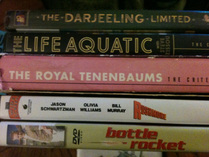 After dessert at my house, I gave Janie her Valentine’s Day present. After running around Lexington for almost three hours, and visiting a total of six different stores, I finally got my hands on what I was looking for: every film by Janie’s favorite writer-director, Wes Anderson. (Die-hard fans of Mr. Anderson will note that his latest film, The Fantastic Mr. Fox is absent.
I didn’t forget it – Janie already owns it.) Hooray for original filmmaking!
Worn out from all the new experiences of the evening, I was both excited and relieved when Janie, on her own accord, suggested we finish the date by watching one of her new films. Now that’s my girl. Being predictable may not be such a bad thing after all – I mean, at least I know what I like
Today’s Challenge: “Today, greet your spouse with love and enthusiasm; determine to
change your greeting to reflect your love for them.”
1) Body Language and Tone
I hate to be wrong, about pretty much everything. That’s nothing new – most people feel the same way. I tend to go a little overboard, though, when it comes to writing, my quest for perfection reaching all new heights that I’ll call “English O.C.D.” Every blog post gets read, reread, and then reread (repeat if needed) before it ever sees the light of day on my website. I check and recheck all Facebook status updates and Tweets for spelling and grammar errors. I even use correct punctuation in text messages – I know, it’s a sickness. In the immortal words of my loving fiancé, when it comes to writing, I’m a “freak.” And let’s be honest, I’m not much better when it comes to everything else.
You can imagine my horror, then, on that rare occasion (a bit of hyperbole) when I’m wrong. To be blunt, I don’t take to it very kindly. A few days ago, I wrote about the precarious topic of having to be told you’re wrong, and how we should own our shortcomings in order to fix them for the ones we love. Of course, when I crafted that blog entry, I knew it would be months before Janie would have to get on me for being off base; obviously, Mr. Love Dare was right on target in his relationship. In actuality, that pipe dream lasted less than three days.
Last night, Janie called me out for my body language and tone of voice. We had gotten into a discussion and weren’t going to agree on the outcome. Of course, remembering what the Love Dare taught me, I refused to lose my temper, biting my tongue to prevent any hurtful words from coming out. I allowed Janie to talk, and I didn’t interrupt her or try to prove her wrong. But despite my best efforts to not verbally communicate anger, my body gave me away. I slumped in my chair, my eyes focused on the corner of the room, away from my fiancé. Each time she said something I disagreed with, I would huff and puff. To be honest, I really didn’t realize I was doing it until she called me out.
“I didn’t say anything!” I cried, defending myself.
“Do you not hear your tone of voice? And look at how you’re acting... you look like a middle-schooler who just had his phone taken away.”
Ouch – it was hard to argue with that. But I tried anyway, pouting all the way to an early bedtime.
I awoke in the morning to this reading from The Love Dare: “You can tell a lot about the state of a couple’s relationship from the way they greet one another… in their expression and countenance… in how they speak to each other.” Dang it.
I should have stopped right there – at least I would have preserved a tiny sliver of hope that I had acted appropriately the night before. Alas, my eyes continued to bounce across the words, even as they convicted me: “It’s probably something you don’t think about very often – the first thing you say to him or her in the morning, the look on your face when you get in the car, the energy in your voice when you speak on the telephone. But here’s something else you probably don’t stop to consider – the difference it would make in your spouse’s day if everything about you expressed the fact that you were really, really glad to see them.” Dang it. Again.
Did I mention I hate it when I’m wrong? Being a future-husband is tougher than I thought.
2) JR Vassar
If I’ve learned anything over the course of the first nine days of February’s Love Dare, it can be summed up in the following tweet, sent my way from my wise best friend, who himself has been happily married for about seven months now. The tweet was originally posted by JR Vassar, founding and lead pastor of Apostle’s Church in New York City.
Well (re)tweeted my friend. 3) Sheldon Cooper English martyr John Bradford, upon seeing a group of criminals being led to the gallows, is said to have remarked, “There, but for the grace of God, go I.” In that instant, he recognized and expressed a universal truth: none of us is better than anyone else. The Big Bang Theory is one of my favorite TV shows. It follows the lives of a group of nerdy scientists – theoretical physicists, to be exact – as they try to make their way in the “real world.” These guys sit around their apartment reading comic books, playing online video games, and making plans to attend Star Trek conventions. More than once, John Bradford’s quotation has run through my mind while watching this show – but for the grace of God, I too would be eating cereal out of a Star Wars bowl while discussing the scientific validity of Dr. Who. Let’s be honest, I’m nothing more than a nerd who’s learned to hide it a little better than others. Across the board, comedies, be they movies, TV shows, or comic strips, employ the use of exaggeration. There is humor to be found in taking a real life situation and expanding it beyond what a “normal” human being might think, do or say. Its what’s unexpected that actually makes a comedy humorous – not unlike how what we don’t see coming in a horror film is what scares us the most. On last week’s episode of Big Bang, two of the main characters, roommates Sheldon and Leonard, got into an argument after Leonard refused to drive Sheldon to his dentist appointment. Having already dedicated an entire day of his busy week to driving his car-less roommate to appointments, Leonard flatly refused his roommate’s request for yet another ride. Having lost his “personal chauffer,” Sheldon assumes his girlfriend, Amy, will happily accept those duties. In the clip embedded below, Amy refuses Sheldon’s request as well, and he surprisingly asks, “You’re my girlfriend, and you’re not going to cater to my every need? Where'd the magic go?” Of course, Sheldon is using exaggeration, and to humorous effect – surely no one would actually think like that, right? We may not express that opinion verbally, but do our lives preach a different sermon? Penny, a friend of Sheldon’s, immediately turns to him and remarks, “That’s not what girlfriends are for.” A sobering reminder, from a show meant to make us laugh, that girlfriends, fiancés and wives (as well as boyfriends and husbands) were not created to be our servants. In fact, if I’m following Christ, my first attitude should be one of service to my partner, and not from her. After seeing the pride and arrogance of the Pharisees, Christ told His disciples and those following Him that “ the person who is greatest among you will be your servant… and whoever humbles himself will be honored.” It’s time for men, myself included, to embrace this teaching where it’s most difficult – at home.
Today’s Dare: “…Spend a few minutes writing out positive things about your spouse…”
In today’s reading from The Love Dare, the authors described our hearts as having two “rooms” in which, depending on the state of their relationship, couples tend to dwell within. Obviously, these are not physical places; instead they represent a mode of thinking, a state of mind.
The first area, known as the Appreciation Room, is the place where we store all the good attributes of our mate. The walls are covered in words like “honest,” “loving,” and “funny.” Spending time in this “room” results in an ever-growing appreciation for our fiancé or spouse. The lights shine bright in this room; here all is good.
Unfortunately, we don’t have to travel far to find the second area of our hearts – in the Depreciation Room the lights are dim, shadows allowed to fill most of the empty space. It is here that the human frailties and weaknesses of our spouses are stored. The walls of this room read like an accusation: “selfish,” “impatient,” “controlling.” Any amount of time spent in this room results in bitterness, anger, and a devaluing of the one we once vowed to love. Fed by darkness, the seeds of divorce grow here.
Of course, both rooms contain the truth – our mates are an assortment of both the image of God, imprinted upon them by their Creator, and the inescapable consequences of sin. We are married (or engaged) to a human being that is, at best, a 50-50 mixture of life-giving attributes and frustrating shortcomings. So where will we spend our time – in the area of our heart the builds up and shines the light of love, or the room that tears down, covering what little light there is with a heavy blanket?
I found the analogy of the two rooms to be extremely helpful. I’ll admit, I can be a bit on the pessimistic side; being challenged to remain aware, moment-by-moment, of which “room” I’m inhabiting was an eye opening experience. Janie has an overwhelming amount of positive attributes, but, from my thoughts and actions, you’d think I wanted to dwell, instead, on the minor things that cause friction in our relationship. Today’s challenge, to create a list of what’s great about my fiancé, was an important first step in forcing me back into the room that leads to life. But I wanted to take it a step further; I wondered what my Appreciation Room would actually look like. Posted below is my best rendering of what actually exists within my heart.
Reading over the wall, I’m left with only one thought: God has blessed me tremendously.
Yesterday’s Dare: “ Ask your spouse to tell you three things that cause him or her to be uncomfortable or irritated with you. You must do so without attacking them or justifying your behavior. This is from their perspective only.” I have a personal revelation that is going to rock your world – a real shocker. I don’t think you’re ready for this … maybe you should sit down. Okay, here goes: I’m not perfect. I know, I know – it’s hard to believe, right? But there it is, in black-and-white. And now it’s on the Internet, so it must be true. Obviously, that was a bit facetious, it’s no surprise that humanity, myself included, falls far short of perfection. In fact, we see it everyday in others – the lady at work who gossips nonstop, that friend who never owns his mistakes, or the way the kids always leave their shoes at the foot of the stairs, despite the fact that you’ve told them at least a hundred times to stop doing that. The funny thing about us humans, we so easily see the imperfect in others – their irritating and rude behavior – all the while remaining blissfully blind to our own shortcomings. But whether we want to admit it or not, the stain of imperfection is found on all of us. I’ll be honest, it’s difficult to admit to our flaws; it takes a degree of self-awareness that I usually don’t possess just to be able to recognize those areas inside myself that need improvement. That’s why God gave us family, but Lord-help-em when they try to delicately point out those inadequacies. I know I don’t handle those conversations very well. I expect, because of their love for me, that those closest to me will ignore and just learn to live with my bad habits. Yet I can’t ignore the fact that this statement stands in stark contrast to the Scriptures, which themselves proclaim that “love isn’t selfish.” And honestly, nothing could be more self-centered than causing pain in others – the people I claim to love – because I refuse to improve myself. That’s where the Love Dare was coming from when it challenged me to ask Janie what three things I do to cause her the most irritation or discomfort. In the interest of allowing her some degree of privacy, I’m not going to cite them word for word – but they related to these three topics: 1) My tendency to interrupt or become distracted when she’s talking 2) Hygiene issues related to my house 3) Disrespect for her time To be honest, none of these revelations took me by surprise – she has been patiently asking for improvement in these areas for some time. I should be ashamed, not that I have areas of my life that need polishing, but that I’ve managed to make little progress despite the fact that they’ve repeatedly being brought to my attention. It’s just easier to be interrupting, messy, and slow than it is to listen, clean, and respect Janie’s time – but if that’s true, then I need to admit that I’m not truly loving her, because “ love does not dishonor others,” and “ it is not self-seeking.” The thing about great art is that it is both personal and universal. As I was thinking about the need to recommit myself to improvement in these three areas, a song that Derek Webb wrote for his wife began playing in my head. While it was written for his situation, it certainly speaks truth into my own. While I may have a reputation with others, I don’t want one with Janie – instead, it’s my desire to be man enough to change; brave enough to improve myself in the areas that hurt the ones I love most. Step one: tackling that unsanitary bathroom problem.
|
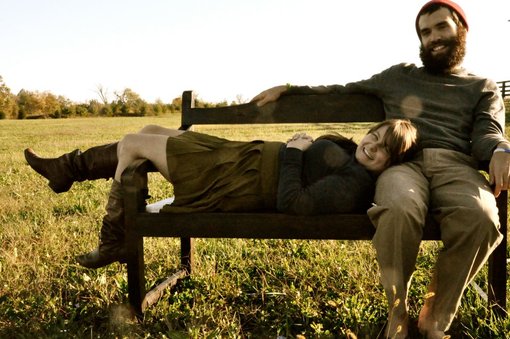


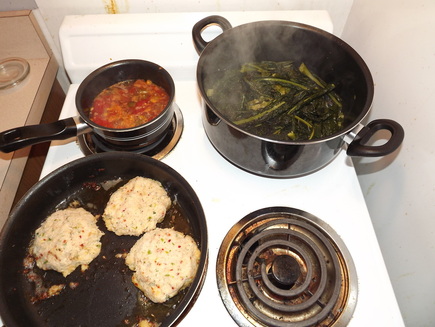
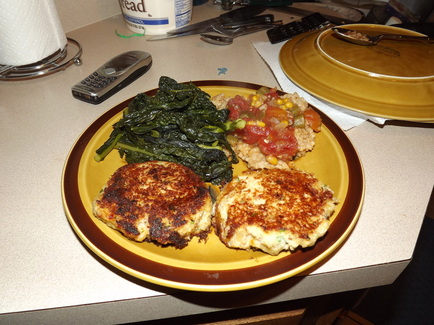
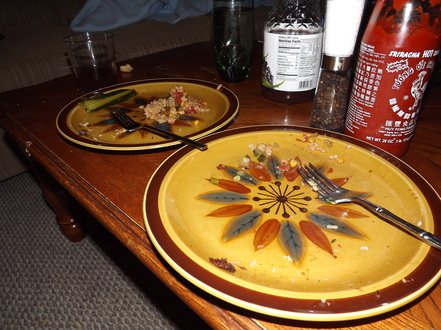





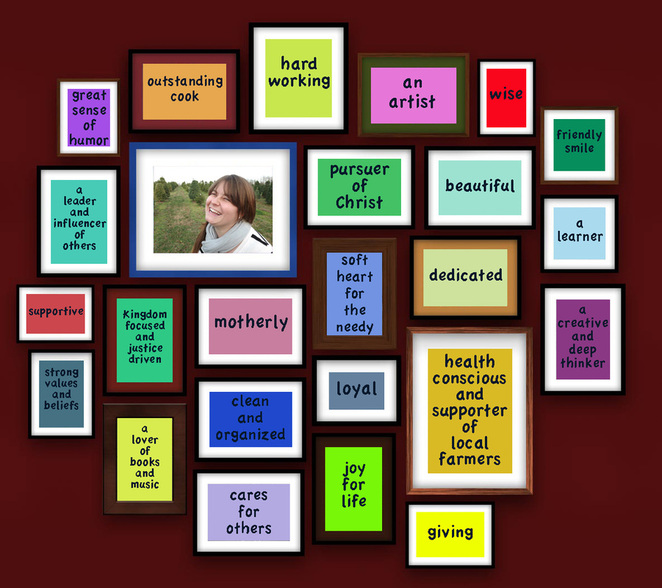
 RSS Feed
RSS Feed